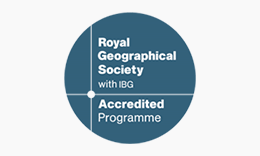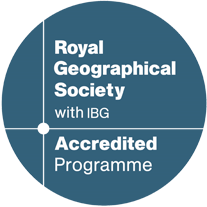Geography Code F801 Attend an Open Day Attend an Open Day
Apply NowKey Facts
F801-
UCAS Tariff
120 - 96
-
Course duration
3 years
Available for September start 2025
Further details on entry requirements
Apply NowOur BSc degree scheme in Geography offers you the opportunity to study two thirds of the course with our team of Welsh-speaking lecturers. The English-medium equivalent is F800.
The Aberystwyth University Geography Department is one of the most established and experienced of its kind. Aberystwyth University offers you an unique opportunity to study geography in one of the most beautiful locations in Europe. The Department of Geography and Earth Sciences is situated on Cardigan Bay and is surrounded by a great diversity of beautiful environments, including marine, moorland, mountain and grassland, The Department is uniquely placed to make the most of the stunning landscapes that surround it, providing you with a fabulous variety of fieldwork and recreational opportunities. This degree will equip you with the skills, abilities and expertise to engage with the challenges facing society today.
Course Overview
Modules September start - 2025
Please note: The modules listed below are those currently intended for delivery during the next academic year and may be subject to change. They are included here to give an indication of how the course is structured.
| Module Name | Module Code | Credit Value |
|---|---|---|
| Earth Surface Environments | GS10520 | 20 |
| Place and Identity | GS14220 | 20 |
| Module Name | Module Code | Credit Value |
|---|---|---|
| Concepts for Geographers | GS20410 | 10 |
| Geographical Information Systems | GS23710 | 10 |
| Physical Analysis of Natural Materials | GS22010 | 10 |
| Quantitative Data Analysis | GS23810 | 10 |
Options
| Module Name | Module Code | Credit Value |
|---|---|---|
| Geographical Perspectives on the Sustainable Society | GS28910 | 10 |
| Reconstructing Past Environments | GS21910 | 10 |
| The Frozen Planet | GS23510 | 10 |
| Module Name | Module Code | Credit Value |
|---|
Options
| Module Name | Module Code | Credit Value |
|---|---|---|
| Applied Environmental Management | GS31120 | 20 |
| Everyday Social Worlds | GS33320 | 20 |
| Glaciers and Ice Sheets | GS33420 | 20 |
| Memory Cultures: heritage, identity and power | GS37920 | 20 |
| Modern British Landscapes | GS36220 | 20 |
| Monitoring our Planet's Health from Space | GS32020 | 20 |
| The Global Countryside: Geographical and Sociological Perspectives | GS36820 | 20 |
| The psychosocial century | GS30020 | 20 |
| Urban Risk and Environmental Resilience | GS37520 | 20 |
| Volcanic Activity: Hazards and Environmental Change | GS30420 | 20 |
* Also available partially or entirely through the medium of Welsh
Careers
Teaching & Learning
Student Testimonials
Typical Entry Requirements
UCAS Tariff 120 - 96
A Levels BBB-CCC
GCSE requirements (minimum grade C/4):
English or Welsh and Mathematics
BTEC National Diploma:
DDM-MMM
International Baccalaureate:
30-26
European Baccalaureate:
75%-65% overall
English Language Requirements:
See our Undergraduate English Language Requirements for this course. Pre-sessional English Programmes are also available for students who do not meet our English Language Requirements.
Country Specific Entry Requirements:
International students whose qualification is not listed on this page, can check our Country Specific Entry Requirements for further information.
The University welcomes undergraduate applications from students studying the Access to Higher Education Diploma or T-level qualifications, provided that relevant subject content and learning outcomes are met. We are not able to accept Access to Higher Education Diplomas or T-levels as a general qualification for every undergraduate degree course.
Our inclusive admissions policy values breadth as well as depth of study. Applicants are selected on their own individual merits and offers can vary. If you would like to check the eligibility of your qualifications before submitting an application, please contact the Undergraduate Admissions Office for advice and guidance.


